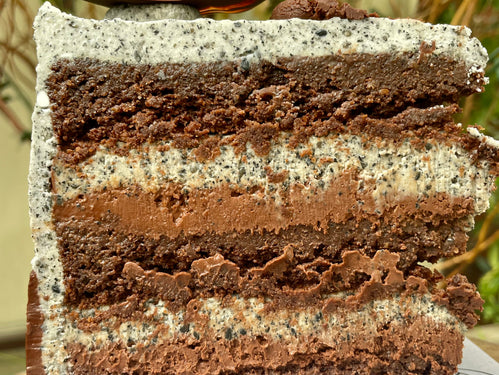More Plants = Happy, Healthy Gut
Fiber, Fiber, Fiber
The term gut health seems to be popping up everywhere in the nutrition and wellness world these days. But what does this actually mean and how does one go about ensuring proper gut health? Well, let's start with the terms gut microbiota and gut microbiome. The gut microbiota refers to an expansive community of microorganisms that live inside us. Each serving a purpose. The gut microbiome is the collection of genomes (genetic information) of the microorganisms within a specific community. Having a healthy, well-balanced gut microbiome is essential for health and longevity. Immunity, hormonal balance, metabolism, cognition, and gene expression are all interconnected with the gut (1). Damage to the gut microbiome can play a role in everything from depression, anxiety, and cognitive function to various autoimmune diseases such as asthma, allergies, food sensitivities, eczema, type 1 diabetes, rheumatoid arthritis, and ulcerative colitis (2).
So where does fiber come in? Fiber helps feed your gut microbes which allows your gut to heal. These microbes go on to process the fiber within the colon and produce short chain fatty acids which promote a healthy gut microbiome and reduce the risk of disease (3). We get our fiber intake from a wide variety of plant foods including fruits, vegetables, whole grains, beans, and seeds. Think whole, unprocessed foods here - berries, apples (with skin), chia seeds, ground flax seeds, quinoa, chickpeas, brussel sprouts, etc. We’ve come a long way with nutrition to know that a bran muffin or a dissolvable fiber powder isn't our only option to ensure a healthy fiber intake. Fiber is America’s shortfall ingredient with about 95% of us not getting enough fiber in our diets (4). Protein is not what our society is lacking, it’s fiber.




Count Plants, Not Calories
Counting calories is so 90’s. Do we want the 90’s back? Yes for fashion and music’s sake, but not for the diet culture. Counting calories is complicated and does not educate the dieter about the quality of the food being consumed. Current diets have also gotten unnecessarily complicated. We as a society are vilifying carbs and sugars from various plants to the point where the dieter takes calculated steps to remove the plant from the diet completely. When plants start to get removed from a diet or are never even introduced in the first place, the body is not only missing out on essential nutrients but the gut microbiome cannot thrive. So you have your white sugars, high-fructose corn syrup, and ultra-processed carbs. These are comprehensively different from consuming sugars and carbs from plants. With fruits for instance, you are consuming fiber, antioxidants, phytonutrients, and vitamins all in one.
In 2016, the American Gut Project found that consuming 30+ different plants in a given week was the greatest predictor of a healthy gut microbiome (5). This was a global citizen effort in science and over 11,000 people participated. About 300,000 out of the 400,000 varieties of plants on Earth are edible (6). Yet, only around 200 species of plants around the world are consumed. So, if you’d like to participate in a fun activity, write down all the plants you’ve consumed in one day. Maybe do the same the next day. And maybe at the end of the week you will have hit 30 different plants. Now, it’s actually quite easy to get well over 30 a week if you are up to bringing new plant varieties into your kitchen. Pro-tip, every time you go to your local grocery store or farmer’s market, try a new plant. Pick up an ancient grain you’ve never heard of, an in-season squash variety, or a new dark leafy green. Get into the habit of trying new plants and your gut will thank you.
Fermented Foods
Dr. Will Buelsewicz, MD, MSCI of Fiber Fueled created an acronym F.G.O.A.L.S. which is a powerful combination of plants to work into your diet as often as possible (7).
F - Fruit & Fermented
G - Greens & Grains
O - Omega-3 Super Seeds
A - Aromatics (onions, garlic)
L - Legumes
S - Sulforaphane (broccoli, sprouts, and other cruciferous vegetables)
Fermented foods are a great way to get natural probiotics (which are microorganisms that live within the gut). According to a Stanford University study, a diet rich in fermented foods not only increases microbiome diversity, but also improves immune responses (8). This goes back to the interconnectedness of the gut and immunity. So many different cultures around the world have a version of fermented foods within their diet. Sauerkraut from Germany - no it’s not just a hot dog or reuben topping. Add some crunch and a salty factor to your next grain bowl or salad. Kimchi from Korea, tempeh from Indonesia, or miso from Japan. Fermented food can be found in breads as well. Injera, the delicious spongy flatbread from Ethiopia that also doubles as a utensil to collect plant-dense stews. And sourdough is a great option which you may already know how to make via the internet during 2020 shelter-in-place orders. Working fermented foods into your diet will help digestion, regularity, and overall health through a diverse microbiome.



Plant Diversity at P.S. & Co. - with plant points!
*Not including our abundance of healing dry spices
Organic French Bread Pizza - Approx 15 plant points (with fermented foods!)
Organic Hand-Cut Nachos - Approx. 14 plant points (with fermented foods!)
Organic Mohinga Noodle Soup- Approx. 13 plant points
Organic Forbidden Bowl - Approx 10 plant points (with fermented foods!)
Organic Spicy BBQ Tempeh Kale Caesar Salad - Approx 8 plant points (with fermented foods!)
Organic Burmese Chickpea Curry - Approx 7 plant points (with fermented foods!)
Organic Protein-Packed Amaranth - Approx. 7+ plant points
Organic Muesli Bar - Approx 7 plant points
And so much more…
_________________________________________________________________________________
1Bulsiewicz, Will (2022). 8. Fiber fueled: The plant-based gut health program for losing weight, restoring your health, and... optimizing your microbiome. Avery Pub Group.
2 Xu H, Liu M, Cao J, Li X, Fan D, Xia Y, Lu X, Li J, Ju D, Zhao H. The Dynamic Interplay between the Gut Microbiota and Autoimmune Diseases. J Immunol Res. 2019 Oct 27;2019:7546047. doi: 10.1155/2019/7546047. PMID: 31772949; PMCID: PMC6854958.; Bulsiewicz, Will (2022). 16. Fiber fueled: The plant-based gut health program for losing weight, restoring your health, and... optimizing your microbiome. Avery Pub Group.
3 Laura Fisher Laura Fisher, & Fisher, L. (2022, May 4). The #1 predictor of a healthy gut microbiome. Well+Good. Retrieved October 20, 2022, from https://www.wellandgood.com/healthy-gut-microbiome/
4 Quagliani D, Felt-Gunderson P. Closing America's Fiber Intake Gap: Communication Strategies From a Food and Fiber Summit. Am J Lifestyle Med. 2016 Jul 7;11(1):80-85. doi: 10.1177/1559827615588079. PMID: 30202317; PMCID: PMC6124841.
5 Bulsiewicz, Will (2022). 74. Fiber fueled: The plant-based gut health program for losing weight, restoring your health, and... optimizing your microbiome. Avery Pub Group.
6 Bulsiewicz, Will (2022). 75. Fiber fueled: The plant-based gut health program for losing weight, restoring your health, and... optimizing your microbiome. Avery Pub Group.
7 Bulsiewicz, Will (2022). 152. Fiber fueled: The plant-based gut health program for losing weight, restoring your health, and... optimizing your microbiome. Avery Pub Group.
8 News Center. (2021, July 12). Fermented-food diet increases microbiome diversity, decreases inflammatory proteins, study finds. News Center. Retrieved October 21, 2022, from https://med.stanford.edu/news/all-news/2021/07/fermented-food-diet-increases-microbiome-diversity-lowers-inflammation.html#:~:text=Stanford%20researchers%20discover%20that%20a,diversity%20and%20improves%20immune%20responses.&text=Stanford%20researchers%20found%20that%20eating,is%20associated%20with%20improved%20health.





Leave a comment
This site is protected by hCaptcha and the hCaptcha Privacy Policy and Terms of Service apply.